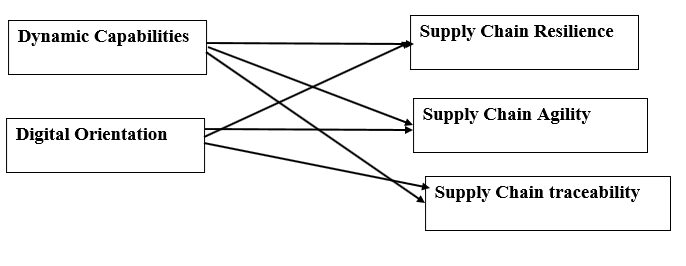In a recent decade, the UAE government initiated a major transition in terms of economic revival. The one of strategic transitions was to focus on investments in the tourism sector. The main focus was made on customer-centricity and the use of advanced internet technologies to promote the tourism sector internationally. However, the coronavirus pandemics negatively influenced these efforts. Now it requires critical analysis of industry capabilities versus supply chain planning.
The research objectives of the study include the exploration of organizational perspectives related to dynamic capabilities and digital orientation through sensing UAE hotel staff responses, the evaluation of the impact of customer centricity efforts on the hotel supply chain optimization, and providing meaningful recommendations for hotel supply chain performance improvement using both primary and secondary research.
The importance of the research is explained by the following factors. First, it is important to develop a clear vision of whether current practices are well adopted by hotel operators. Second, during crises, times hotels should develop new marketing and supply chain management strategies to ensure business profitability. Finally, new investment mechanisms might be relevant to ensure that the business sector is being developed, anticipating the importance of tourism and construction sectors for the UAE economy.
The study contributes to the business and academia in the following manner. First, it is expected that one could be helpful to design new policies that help to attract and retain tourists, both locally and internationally. Second, the study is aimed to provide the UAE government with evidence of the tourism sector perspectives. Finally, the contribution to academic research among UAE research practitioners will be made to ensure the comprehension of factors that affect supply chain resilience, agility, and traceability.
The literature review related to the exploration of how hotels develop dynamic capabilities is based on two studies. In the first study, Khan et al. (2017) mentioned that sensing, seizing, and business transformation are essential components of the hotel destination management practice that leads to a better understanding of the customer value. Gretzel et al. (2015) mentioned that purchase or service is no longer relevant for the hotel industry since the experience is a more important variable to be estimated in terms of dynamic capabilities. Hence, the co-creation of experiences is essential for dynamic capabilities development.
Digital orientation in hotels is primarily driven by the principles of smart hospitality that were described in several research papers such as Jasinskas et al. (2016) and Zaidan et al. (2016). The importance of collecting the data through the use of ICT was considered critical to ensure the principles of interoperability and managing basic aspects such as room occupancy rates. However, digital orientation principles described in the aforementioned studies were also helpful for budget optimization and developing logical cost-saving strategies.
Supply chain resilience is the ability of hotels to manage critical stages of business operations and restore back to the normal stage. It could be caused either by crisis times or external factors that lead to business transformation. The factors such as procurement and legislative changes, managerial disagreements, and travel bans are considered as the most significant issues (Brown et al., 2017; Moon & Sprott, 2016).
Speaking about supply chain agility, it is essential to consider that one is aimed to promote transparent information flow among third parties, customers, and suppliers. The use of information technologies helps to excel in this area. However, it is also important to ensure that hotels are adaptive to external shocks such as travel restrictions, while they are still agile to work on a common basis for the local customers.
Traditionally, hotels seek for collecting customer data based on official documents. However, in the digital era, the supply chain traceability aspect could be utilized through more advanced research methods like building digital profiles of regular customers based on the big data analysis that shows the tendencies towards hotel preferences. Hence, the traceability of the hotel supply chain is seen as highly dependent on the ICT capabilities and overall technology penetration.
A quantitative research approach was used for the current study. A survey that targeted 86 participants overall was used through online distribution, where the respondents are hotel operators in the UAE. The responses were collected during one month, asking the respondents to evaluate the statements pertaining to the sections of dynamic capability, digital orientation, and supply chain resilience, agility, and traceability. The data were analyzed using statistical tools such as descriptive statistics and ANOVA analysis.

The proposed theoretical framework assumes that we use dynamic capabilities and digital orientation as independent variables, while each of those acts as factors to evaluate the case-by-case relationship with supply chain resilience, agility, and traceability. The framework is based on the literature proceedings and group awareness about the patterns of UAE hotel management systems.

In terms of the employee service period, the largest cohort is 22 individuals or 52.4% of respondents working in the organization for two years or less. They are followed by 11 individuals or 26.2% of respondents working in the organization for more than 5 years, and 9 individuals or 21.4% of respondents working less than 5 years. In terms of the workforce size, half of all respondents indicated that the hotel employs less than 500 employees, followed by 17 individuals or 40.5% of respondents specifying that the hotel employs between 500 and 1000 employees, and 4 individuals or 9.5% of respondents indicating that the hotel employs more than 1000 employees. Finally, in terms of sales volumes as of 2019, 18 individuals or 42.9% of respondents reported having more than $5 million, 16 individuals or 38.1 of respondents reported having between $1 and $5 million, while 8 individuals or 19% of respondents reported less than $1 million of sales volume.

The table supports the findings by demonstrating average values above 5 for all variables specified in the framework. The highest scores are observed for independent variables of dynamic capabilities, with a mean of 6.128, the standard deviation of 0.759, and variance of 0.576, as well as digital orientation, with a mean of 6.107, the standard deviation of 0.815, and variance of 0.761. However, the dependent variables show that the opinions about hotel supply chain effectiveness were less optimistic, where supply chain was reported with a mean of 5.899, the standard deviation of 0.945, and variance 0.893, supply chain agility was reported with a mean of 6.040, the standard deviation of 0.751, and variance of 0.565, while supply chain traceability was rereported with a mean of 5.958, the standard deviation of 0.831, and variance of 0.690. Nevertheless, the overall skewness of the data with average scores higher than 5 and comparatively low values below 1 for both standard deviation and variance demonstrate that all participants positively agreed about the success of organizations they employed with. It implies that there is a positive organizational climate in researched hotels, while additional inquiry on employee judgment is needed.
To validate internal data consistency, reliability testing was performed using Excel formulas. Creswell and Creswell (2017) explained that reliability should be measured by the Cronbach’s alpha coefficient, which considers the number of items in a survey, the sum of variances per each response item, and the total variance per individual response. For the current study, the estimated reliability coefficient is 0.9689, which is a very good result since it is close to 1 and much higher than 0.7 as a minimum threshold to treat the survey results internally consistent (Creswell & Creswell, 2017).

For the hypotheses, the ANOVA analysis was used as a methodological approach. The above figure provides a common reporting approach that was used for the hypothesis analysis highlighted in the paper. The common finding is that dynamic capabilities and digital orientation are not significantly related to supply chain resilience, agility, and traceability.
Referring to the descriptive results, the study suggests that overall hotel employees are confident about organizational stance and potential to satisfy increasing customer demands, as well as feel confident about the overall hotel supply chain effectiveness. With minor deviations, almost all respondents rate dynamic capabilities and digital orientation as highly developed components of the internal service model, while some express certain concerns about the supply chain effectiveness. Considerably, it is generally a good sign of organizational climate and future potential of the hospitality industry in the UAE during crisis times that would support emerging trends in developing customer focus as a core competence.
The first implication is employee sensing, which is needed to understand whether hotel employees are prepared for transformation related to the scope of services provided by hotels. The second implication is to evaluate whether the digital focus on service provisions relates to innovative supply chain practices. Finally, the search for government partnership is essential to develop new opportunities for hotel services improvement.
There are several important limitations that were identified for the current research. First, there is a lack of academic background to develop a theoretical framework for the UAE context. Second, international hotel management practices were considered because of the aforementioned constraint. Third, in quantitative terms, 42 responses for the survey are not enough consistent statistically, since 100 responses fit best to report statistical significance. Eventually, it is affected by coronavirus pandemics and the non-availability of the hotel staff.
Hotel supply chain operations based on resilience, agility, and traceability are not affected by dynamic capabilities and digital orientation. Potentially, supply chain effectiveness should be analyzed based on external factors such as pandemics and actions of the UAE government. Hence, the development of new models for societal interaction is needed to ensure hotel focus on local visitors.
References
Brown, N. A., Rovins, J. E., Feldmann-Jensen, S., Orchiston, C., & Johnston, D. (2017). Exploring disaster resilience within the hotel sector: A systematic review of literature. International Journal of Disaster Risk Reduction, 22, 362-370. Web.
Creswell, J. W., & Creswell, J. D. (2017). Research design: Qualitative, quantitative, and mixed methods approaches (5th ed.). SAGE Publications.
Gretzel, U., Sigala, M., Xiang, Z., & Koo, C. (2015). Smart tourism: Foundations and developments. Electronic Markets, 25(3), 179-188. Web.
Jasinskas, E., Streimikiene, D., Svagzdiene, B., & Simanavicius, A. (2016). Impact of hotel service quality on the loyalty of customers. Economic Research-Ekonomska istraživanja, 29(1), 559-572. Web.
Khan, M. S., Woo, M., Nam, K., & Chathoth, P. K. (2017). Smart city and smart tourism: A case of Dubai. Sustainability, 9(12), 2279. Web.
Moon, H., & Sprott, D. E. (2016). Ingredient branding for a luxury brand: The role of brand and product fit. Journal of Business Research, 69(12), 5768-5774. Web.
Zaidan, E., Taillon, J., & Lee, S. (2016). Societal implication of UAE tourism development. Anatolia: An International Journal of Tourism and Hospitality Research, 27(4), 543-545. Web.